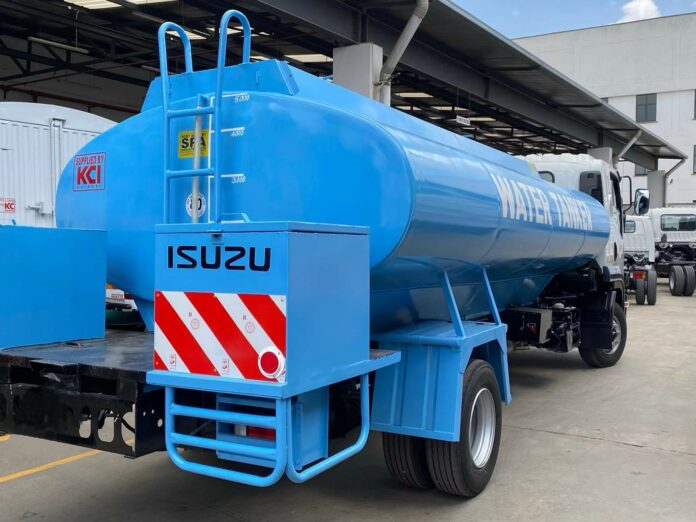Life always throws curveballs. Many will say when you get lemons, make lemonade. Mamlaka Njeri took this to a whole new level. She is a Kenyan entrepreneur running a successful water bowser and refilling business.
Born and raised in a humble family of two boys and three girls, Njeri always dreamed of improving her family’s living standards. She attended primary and secondary school in Kenya.
Unfortunately, her father passed away while she was in Form 3, leaving her mother to support the family alone.
After high school in 2014, she failed to meet the minimum threshold for university in the country. Life didn’t get any easier for free her from the shackles of poverty.
Two years later, Njeri got the chance to work in Saudi Arabia as a house help. The agency she connected with assured her of good treatment abroad, and after consulting with her family, she grabbed the opportunity with both hands.
“It was not an easy decision. But I knew I had to do something to support my family,” she said.
Upon arriving in Saudi Arabia, Njeri faced scorching heat, unfamiliar customs, and a language barrier. Despite these challenges, she remained dedicated to her work and gradually adapted.
During her time there, Njeri quietly and persistently saved money back home. “I opened a bank account at the NCBA Bank from which I would transfer my earnings and make any transactions I wanted via internet banking while in Saudi,” she says.
“I also wanted to build this account and have a good rapport with the bank in the event I required financing to set up projects or businesses when I returned. I felt like I had killed two birds with one stone.”
Her contract lapsed after two years and she return to Kenya. By this time, Njeri had resolved that she would venture into entrepreneurship. “I was not ready to be employed again. And with the funds I had built up, I was convinced that I would have a good head-start,” she says.
In Kenya, she researched, consulted and brainstormed on business ideas that would have a sustainable return on investment. “I settled on a water refilling and water bowser business,” she says. She approached NCBA Banking Agent James Waithaka who talked her through the asset financing process, benefits, the fees and charges, and the risks involved.
Njeri was anxious to get her business off the ground. She pooled her savings together to register her business and placed a deposit for an Isuzu truck.
“Waithaka was incredibly helpful. He explained the financing options available and how NCBA could help me buy the truck I needed,” she said. Incidentally, this was around the same time that Isuzu East Africa and NCBA were partnering to finance business owners with trucks from Isuzu.
“We recognize that our customers would like to purchase vehicles but do not know how the loan market will react. This deal with NCBA will ensure our customers continue to enjoy our dependable vehicles and service their businesses without fear,” said Charles Kariuki, Isuzu EA Director of Finance and Strategy at the time.
With the bank’s support, Njeri acquired an Isuzu NMR 5,000 water bowser truck that was at the time worth Sh. 3.8 million.
“The day the truck with bowser was handed over to me will always be one of my fondest milestones. It may not have been possible to do it on my own, but the rates and repayment options I was offered were fair and the bank ensured the process was streamlined,” she says.
Peter Muema: How I built my two storey home in 10 months with Sh. 7 million
Njeri’s business took off fast and became a mainstay within her community within one year. Since launching in late 2020, she has expanded with financing from the bank and now has four water bowser trucks and a Nissan NV100 for bottled water refill deliveries. She has also rented office space and is looking to expand into nearby towns within the coming months.
“It has been an incredible journey. Who would have thought that starting as a housemaid in Saudi Arabia would lead to this?” she says. “If you have a dream, don’t sit back just because you don’t have enough capital. Don’t let anything or anyone hold you back.”
*********
A spot check by Bizna Kenya showed that some of the financing requirements that Njeri was required to meet included:
- A complete asset finance application form
- Bank statements and M-Pesa statements for all transactions she had made
- True copies of identification and registration documents (Including KRA PIN)
- Original and signed pro-forma invoice confirming the costs of the asset to be purchased and the receipt of the deposit already paid to the dealers
- Copy of the asset’s registration documents or import paper










